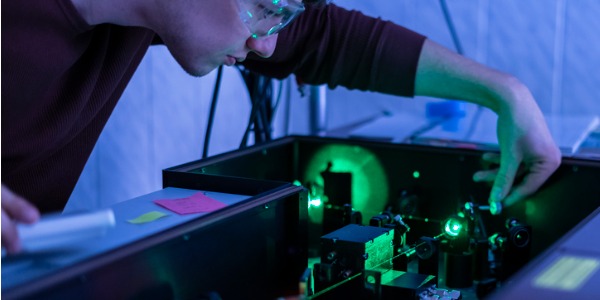What is a Laser Technician?
A laser technician is skilled in the operation and maintenance of laser equipment across various industries. These technicians work in fields such as healthcare, where they assist in surgical procedures, diagnostic imaging, and therapeutic treatments. In the beauty and aesthetics industry, laser technicians perform cosmetic procedures like hair removal, skin rejuvenation, and tattoo removal. They also play significant roles in manufacturing, operating laser cutting and welding machines, and ensuring product quality. Furthermore, laser technicians contribute to research, telecommunications, and entertainment, where laser technology is utilized for various applications.
What does a Laser Technician do?

Duties and Responsibilities
The duties and responsibilities of a laser technician can vary depending on the specific industry and field of specialization, but generally include:
- Operating Laser Equipment: Laser technicians are responsible for operating various types of laser equipment, including surgical lasers, aesthetic lasers, industrial lasers, and research lasers. They ensure that the equipment is properly calibrated and set up for specific applications, and they follow safety protocols to minimize risks to themselves and others.
- Maintaining Laser Equipment: Laser technicians perform routine maintenance and troubleshooting tasks to ensure the proper functioning of laser equipment. This may include cleaning optical components, replacing consumable parts, performing calibration checks, and troubleshooting technical issues to ensure optimal performance.
- Assisting with Procedures: In healthcare settings, laser technicians assist medical professionals during surgical procedures, diagnostic imaging, and therapeutic treatments. They may position patients, set up equipment, and provide support to ensure smooth and efficient procedures while adhering to safety protocols.
- Providing Patient Care: Laser technicians in healthcare settings may also provide patient care before, during, and after procedures. They explain procedures to patients, answer questions, address concerns, and provide post-procedure care instructions to ensure patient comfort and safety.
- Documenting Procedures: Laser technicians maintain accurate records of procedures performed, including patient information, equipment settings, and any complications or adverse reactions. They may also assist with documentation and compliance with regulatory requirements related to laser safety and patient care.
- Training and Education: Laser technicians may be responsible for training other staff members on the safe and effective use of laser equipment. They stay updated on the latest advancements in laser technology and safety protocols and share their knowledge with colleagues to ensure best practices are followed.
Types of Laser Technicians
There are various types of laser technicians based on their field of specialization and the industries they work in. Some common types of laser technicians include:
- Medical Laser Technicians: Specialize in operating laser equipment used in medical settings for surgical procedures, diagnostic imaging, and therapeutic treatments. They work closely with healthcare professionals to ensure the safe and effective use of lasers in patient care.
- Aesthetic Laser Technicians: Focus on performing cosmetic procedures such as hair removal, skin rejuvenation, tattoo removal, and scar reduction using laser technology. They assess clients' needs, recommend appropriate treatments, and administer laser therapies in beauty clinics or medical spas.
- Industrial Laser Technicians: Operate laser cutting, welding, and engraving machines used in manufacturing and industrial settings. They are responsible for setting up and maintaining laser equipment, ensuring product quality, and optimizing production processes.
- Research Laser Technicians: Work in research laboratories or academic institutions, operating lasers for scientific experiments and studies. They assist researchers in conducting experiments, collecting data, and analyzing results using laser technology.
- Telecommunications Laser Technicians: Play a role in the telecommunications industry, where lasers are used for data transmission in fiber-optic communication systems. They are responsible for maintaining and troubleshooting laser equipment to ensure reliable communication networks.
- Entertainment Laser Technicians: Work in the entertainment industry, operating lasers for laser light shows, concerts, and special events. They design and program laser displays, synchronize lighting effects with music or performances, and ensure safety during live events.
Laser technicians have distinct personalities. Think you might match up? Take the free career test to find out if laser technician is one of your top career matches. Take the free test now Learn more about the career test
What is the workplace of a Laser Technician like?
The workplace of a laser technician can vary depending on their field of specialization and the industries they work in. In healthcare settings, such as hospitals, surgical centers, or medical spas, laser technicians typically work in clean, well-equipped rooms or treatment areas. These environments are often sterile or aseptic to maintain patient safety during surgical procedures or cosmetic treatments. Laser technicians in healthcare settings may work alongside medical professionals such as surgeons, dermatologists, or aestheticians, assisting with procedures and providing patient care.
In industrial settings, such as manufacturing facilities or fabrication shops, laser technicians work in production areas where laser cutting, welding, or engraving machines are located. These environments may be noisy, with machinery operating at high speeds and generating heat and light. Laser technicians in industrial settings are responsible for setting up and maintaining laser equipment, monitoring production processes, and ensuring product quality and efficiency.
In research laboratories or academic institutions, laser technicians work in controlled environments where scientific experiments and studies are conducted. They may work in laboratories equipped with specialized laser equipment and instrumentation for research purposes. These environments may vary depending on the specific research focus, but they typically prioritize safety and adherence to laboratory protocols and procedures.
Laser Technicians are also known as:
Laser Skin Rejuvenation Technician
Laser Esthetician
Laser Skin Specialist
Laser Skincare Specialist
Laser Tech